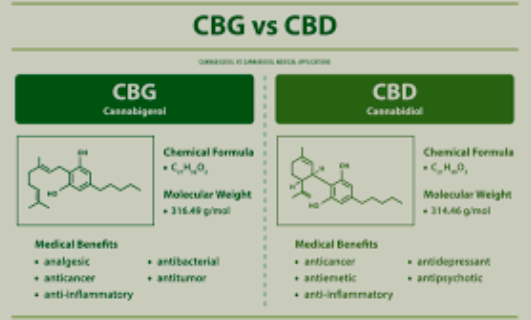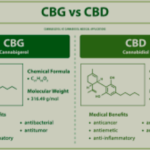The world of cannabinoids is vast and intriguing, with CBD (cannabidiol) and CBG (cannabigerol) being two of the most talked-about compounds. While most people are familiar with CBD due to its popularity in wellness products, CBG is often referred to as the “mother of all cannabinoids.” But what exactly does science say about their effects? Let’s dive into the fascinating world of CBG vs CBD and explore how they work, their benefits, and how they differ from each other.
Understanding the Basics of CBG and CBD
Before we delve into the differences between CBG and CBD, it’s essential to understand what these compounds are and where they come from.
What Is CBG?
CBG, or cannabigerol, is a lesser-known cannabinoid found in the cannabis plant. It’s often called the “mother cannabinoid” because it’s the precursor to other cannabinoids like THC, CBD, and CBC. In young cannabis plants, CBG-A (the acidic form of CBG) is abundant. As the plant matures, CBG-A is broken down into other cannabinoids, leaving only trace amounts of CBG in the mature plant.
Because of its low concentration in most cannabis strains, CBG is often more expensive to extract, but it’s gaining attention for its unique properties and potential health benefits.
What Is CBD?
CBD, or cannabidiol, is one of the most well-known cannabinoids. Unlike THC, the compound that gives marijuana its psychoactive effects, CBD is non-psychoactive, meaning it doesn’t get you “high.” This quality has made CBD a popular choice for those seeking relief from pain, anxiety, and other conditions without the mind-altering effects of marijuana or certain pharmaceutical drugs.
CBD is typically derived from hemp, a variety of cannabis with low THC levels, making it legal in many places.
How Do CBG and CBD Work?
Understanding how CBG vs CBD work within the body involves a quick lesson on the endocannabinoid system (ECS). The ECS is a complex network of receptors and enzymes that play a crucial role in regulating various bodily functions such as mood, appetite, sleep, and pain.
CBG and the Endocannabinoid System
CBG interacts primarily with the CB1 and CB2 receptors in the ECS. The CB1 receptors are mostly found in the brain and nervous system, while the CB2 receptors are more common in the immune system. CBG’s interaction with these receptors suggests it might have potential in treating conditions like glaucoma, inflammatory bowel disease, and even cancer.
Additionally, research suggests that CBG may inhibit the uptake of a neurotransmitter called GABA, which could lead to muscle relaxation and anxiety relief.
CBD and the Endocannabinoid System
CBD, on the other hand, has a more indirect interaction with the ECS. It doesn’t bind strongly with CB1 or CB2 receptors but instead influences them in a way that leads to various therapeutic effects. CBD is known to modulate the ECS by preventing the breakdown of anandamide, a natural cannabinoid that promotes feelings of happiness and well-being.
Moreover, CBD has anti-inflammatory, analgesic, and anxiolytic properties, making it a popular choice for those looking to manage chronic pain, anxiety, and sleep disorders.
The Benefits of CBG vs CBD
Both CBG and CBD offer a range of potential health benefits, but they do so in different ways. Let’s take a closer look at what each cannabinoid can offer.
The Potential Benefits of CBG
- Glaucoma: Early studies suggest that CBG may help reduce intraocular pressure, making it a potential treatment for glaucoma.
- Inflammatory Bowel Disease (IBD): CBG has shown promise in reducing inflammation in animal models of IBD, suggesting it could be beneficial for people suffering from this condition.
- Neuroprotective Properties: CBG has been found to have neuroprotective effects, which could make it a potential treatment for neurodegenerative diseases like Huntington’s disease.
- Antibacterial Properties: CBG is also being studied for its ability to fight bacterial infections, including those that are resistant to traditional antibiotics.
The Potential Benefits of CBD
- Anxiety and Depression: CBD is widely used for its calming effects and is a popular natural remedy for anxiety and depression.
- Pain Relief: CBD has analgesic properties and is commonly used to alleviate chronic pain, including pain from arthritis and multiple sclerosis.
- Epilepsy: One of the most well-known uses of CBD is in the treatment of epilepsy, particularly in children with conditions like Dravet syndrome. The FDA has even approved a CBD-based drug, Epidiolex, for this purpose.
- Sleep Disorders: Many people use CBD to help with insomnia and other sleep-related issues due to its ability to promote relaxation.
Side Effects and Safety of CBG vs CBD
When considering CBG vs CBD, it’s important to also think about their side effects and safety profiles.
CBG Side Effects
Since CBG is less studied than CBD, there is less information available about its potential side effects. However, the limited studies conducted so far suggest that CBG is generally well-tolerated. Some users may experience dry mouth, low blood pressure, or lightheadedness, but these effects are usually mild.
CBD Side Effects
CBD is considered safe for most people, but it can cause some side effects, especially at higher doses. These may include:
- Dry mouth
- Diarrhea
- Reduced appetite
- Drowsiness
- Fatigue
CBD can also interact with certain medications, so it’s important to consult with a healthcare provider before using CBD, especially if you’re taking other drugs.
CBG vs CBD: Which One Should You Choose?
Deciding between CBG vs CBD depends largely on your individual needs and health goals. Here’s a quick guide to help you choose:
When to Choose CBG
- You’re dealing with specific conditions: If you’re looking for relief from conditions like glaucoma, inflammatory bowel disease, or bacterial infections, CBG might be worth exploring.
- You want to try something new: Since CBG is less common, it may offer benefits that you haven’t experienced with CBD.
When to Choose CBD
- You’re looking for a well-researched option: CBD is the most studied cannabinoid and has a solid track record for safety and efficacy.
- You need help with anxiety, pain, or sleep: CBD is well-known for its calming and pain-relieving effects and is a great option for those looking to manage these issues naturally.
What the Future Holds for CBG and CBD
The future of CBG vs CBD is promising, with ongoing research likely to reveal even more about these fascinating compounds. As more studies are conducted, we’ll gain a deeper understanding of their full potential and how they can be used to improve health and well-being.
The Growing Interest in CBG
As interest in cannabinoids continues to grow, CBG is likely to become more popular. Researchers are already looking into its potential for treating a range of conditions, and as more evidence emerges, we could see CBG products become more widely available.
The Established Popularity of CBD
CBD’s popularity shows no signs of slowing down. With its wide range of applications and strong safety profile, CBD will likely remain a staple in the wellness industry for years to come. As research continues, we may discover even more uses for this versatile compound.
Conclusion
When comparing CBG vs CBD, it’s clear that both cannabinoids have unique benefits and potential applications. While CBD is more widely known and researched, CBG is emerging as a powerful cannabinoid in its own right. Whether you’re dealing with anxiety, chronic pain, or specific conditions like glaucoma, both CBG and CBD offer natural options worth considering. As always, it’s essential to do your research and consult with a healthcare professional to determine which cannabinoid is right for you. The world of cannabinoids is constantly evolving, and as science continues to uncover their secrets, we can look forward to even more exciting developments on the horizon.
Feel free to submit more guest posts through Links Building Servcies - Best Prices. Buy Author Account / 1$ Guest Post Here




![How to transfer money from Robinhood to bank account? [Steps]](https://hollywoodrag.com/wp-content/uploads/2024/08/Banking-Across-Europe.jpg)

















